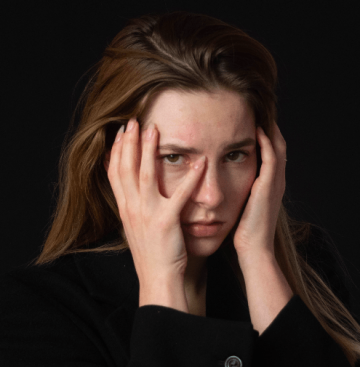Depression
It’s a common disorder that seriously affects one’s everyday tasks. According to WHO, more than 250 million people suffer from depression worldwide.
Depression is a mood disorder, and it’s hard to determine its cause. Many risk factors contribute to depression development, such as genetics (3 times higher risk), complicated life situations (e.g., losing someone), long-term stress, and more.
What are the symptoms?
- Low, hard-to-boost mood, unbalanced throughout the day
- Losing joy in life
- Low energy and motivation
- Feeling empty and hopeless
- Irritation, fatigue or losing self-confidence
- Trouble with memory and concentrating
- Remorse, feeling guilty
- Hallucinations might occur in severe cases
- Low or high appetite
- Physical symptoms might join in: sleeplessness, digestive and heart problems, low sex drive and appetite

Who does it concern?
It affects anyone at any age. Children’s physical symptoms might be abdominal pain, and older children usually skip school. Excessive somnolence (sleepiness) and overeating are typical for coming-of-age children. Insomnia dominates among middle-aged people. Postpartum depression is a chapter by itself – the mother losing the attachment and feeling a failure. Such a situation must be sorted out immediately.
What’s the treatment?
Symptoms of depression must prevail for at least two weeks. If you notice these signs, see your GP, who’ll recommend a psychiatric assessment. If the psychiatrist diagnoses you with depression, they’ll suggest further steps. These may vary for each person. Lifestyle changes are essential (exercise, healthy diet, consciousness control techniques, etc.), but also regular medication can significantly moderate depression symptoms in up to 80% of patients. It’s recommended to add long-term therapy to the biological treatment.
How to prevent it?
- Try to think positively even if it feels impossible. Positive thinking helps you relax and manage stress. Instead of “I can’t do it”, say, “I’ll do the best I can.”.
- Stop for a few minutes during the day and clear your head (a walk or breathing exercises help).
- Focus on activities that boost your mood. Watch your favourite film, read a book before bed, have dinner with friends, or go back to your old hobbies.
- Don’t forget that you can relax not only by watching your favourite series. You can try some sports, yoga or breathing exercises, or walk on the way home from work.
- Set realistic goals. Make a daily to-do list and get the tasks done.
- Live a healthy lifestyle. Avoid alcohol, cigarettes, and other addictions, which worsen anxiety.
FAQ
What to do when…
If someone close to you has a mental illness, do not judge them or tell them to “try harder”. Give them the much-needed support and understanding. They’re far from alone in this.
Who to reach out to?
-
Close person you trust
-
Doctor, therapist, psychologist
-
Support groups, patient organisation
-
Crisis centres, helplines
What are the steps to take?
- Are you in a situation that must be sorted out immediately and can’t deal with it alone? Visit a crisis centre or call a helpline. Children under 18 can visit child crisis centres.
- Are you in a situation where it’s unnecessary to sort it out immediately?
- Can you cover the expense? (800–1,500 CZK per session) See a therapist. They can send you to see a psychiatrist. You’ll find a list of psychotherapists at www.czap.cz, where you can verify their education.
- Can you not cover the expense? See your GP, who’ll recommend you to a professional covered by your health insurance company.
- Don’t you know who to choose? See your GP, and they’ll tell you.
When to see a professional?
What are the basic principles of mental hygiene?
Jaké jsou základní metody péče o duševní zdraví?
Good-quality sleep – Ideally, everyone should sleep between 7–9 hours a night. It all depends on your age, of course. Setting a time you’ll regularly go to sleep and wake up will help a lot.
Balanced and healthy diet – is a building block of mental health, and it supplies us with energy and creates our body's constitution.
Regular exercise – It’s indispensable to overall health. Regular exercise supports our physical and mental health. It relieves stress and anxiety and boosts self-confidence. That’s why it’s an essential factor in mental health prevention. At the same time, it improves the quality of life of people with mental illness (primarily depression treatment). Try to find an activity you’ll like and practise it 3 times a week for at least 30 minutes.
Time management – We all have many responsibilities, so it’s essential to master time management. Add enough relaxing time to your daily schedule (active or passive), and set working and “you” time.
Relaxing and autoregulation exercises – These are essential for mental hygiene, help with purposeful stress management and support inner balance. Relaxing relieves muscle and mental tension and regenerates and recovers our bodies (including the brain). Try yoga, walking, exercising or meditation.
Support online education about prevention
We want people to like prevention and make it a standard part of their lives. That’s why we create infographics, videos, articles or podcasts, which we post on Instagram, YouTube or our website. Help us educate online.
Support online education about prevention
We want people to like prevention and make it a standard part of their lives. That’s why we create infographics, videos, articles or podcasts, which we post on Instagram, YouTube or our website. Help us educate online.

